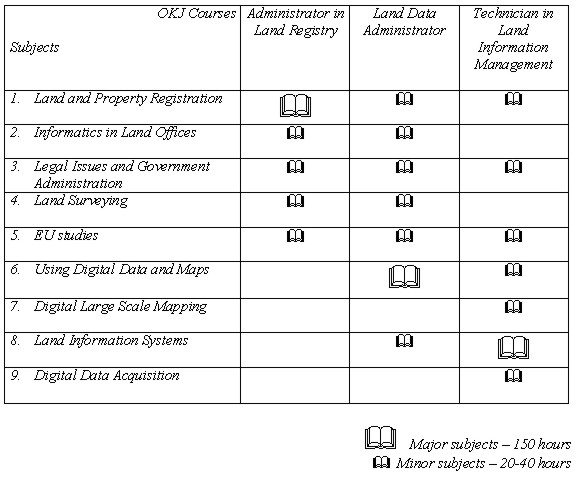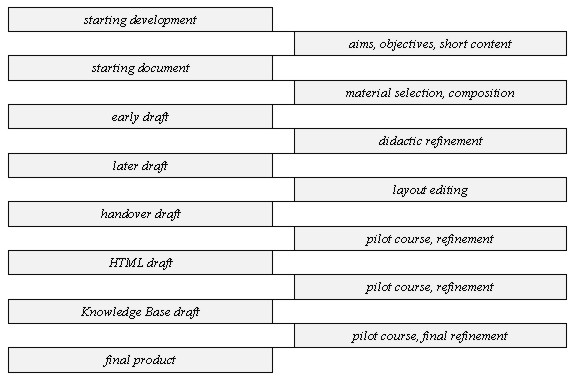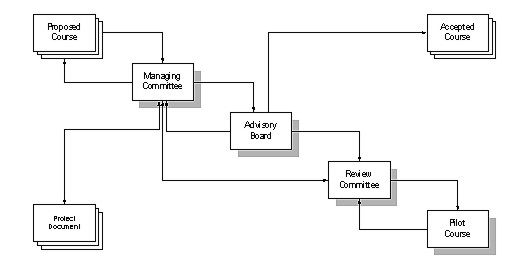NETWORKED EDUCATION IN LAND ADMINISTRATIONProf. Bela MARKUS, HungaryKey words: CPD, networked education and training, virtual academy, metadata. AbstractContinuous training and education has become an important issue in the rapidly evolving information society. A fundamental transformation continues to occur in higher education. Information and Communication Technologies (ICT) are having a deep effect on teaching and learning and are eroding traditional geographical boundaries resulting in greater competition and opportunity. Industry needs education and training programmes that are flexible, tailor made and cost effective. Students or trainees are also changing. Part-time, adult learners know that learning is no longer confined to university campuses, and are seeking flexible ways to meet their personal, academic or employment objectives. In the rapidly-changing world, land administration must offer all employees greater opportunities for access to knowledge, irrespective of their age or social circumstances. The following problems were identified in the United Nations Meetings of Officials in Land Administration (UN MOLA) Workshop on Land Market in 1998 in Budapest: lack of education in the management, legal, economic, human and ethical aspects of land administration; general lack of user oriented approach to education; lack of continuity in education from universities to professions and appropriate linkage between the two. The Bathurst Declaration (1999) documented well that increasing public awareness, developing appropriate institutions and advancing their maturity are critical to the achievement of the aims of securing sustainable development, and for the recognition of the role of land in this context. It is recommended that governments be encouraged to re-engineer their land administration systems so that they better serve the needs of all levels in society. The Declaration recommends in view of the crucial importance of human resources in the management of land, ensure that there is sustained education and training in land administration. The author gives a review of the results, present status and future activities of the projects of The University of West Hungary, College of Surveying and Land Management (CSLM) in building a knowledge base and an education and training network for Land Administration in Hungary. Based on the results reached in distance learning post-graduate courses, these projects focus on middle level professionals and examine the use of ICT for vocational training. The projects will improve the learning methodologies fundamentally and update the content of three professional courses. A new course for a new profession (Assistant in Land Information Management) is under development. INTRODUCTIONIn order to be able to take an active part in the current processes of change, the employees should be able to develop their fund of knowledge on a continuous basis, thus continually expanding and renewing it. This means that it is necessary to promote on a life-long basis creativity, flexibility, adaptability, the ability to learn-to-know and to solve problems. These are the conditions we must meet in order to avoid the rapid obsolescence of skills. New structures must be developed which help anticipating needs and the evolution of job profiles. This problem can be overcome by a joint effort on the part of specialised training and higher education establishments. Cooperation between universities, training centres and the business world is the basic way of collecting and transmitting knowledge. In association with public and private partners at national and regional level, they can promote lifelong education. In order to be as effective as possible, it is necessary to anticipate skills needs correctly and to identify the developing areas and the new functions to be fulfilled. The task is to reorganise educational resources in association with the employment services. In an extension of existing education and training programmes, the first objective should be to develop still further the corporate dimension of education: to improve the quality of training and to foster innovation in education by increasing exchanges of experience and information on good practices; to establish an area of training by recognition of qualifications; to promote physical mobility and the virtual mobility made possible by the new technologies of communication; to develop common databases and knowledge on skills needs; to conduct comparative research on methodologies used and policies implemented; to improve the interoperability of systems of distance learning and to increase the level of standardisation of the new decentralized multi-media training tools etc. The Department of Lands and Mapping at the Ministry of Agriculture and Regional Development (MoARD DLM) as the Hungarian Land and Mapping authority has identified a number of areas where it will need to develop in order to work towards the information society and EU harmonisation. These relate strongly to the benefits of computer technology and are the culmination of the continuing managerial educational and organisational improvements of the last ten years. Actions started on
To support the mentioned demands an Open Learning for Land Offices (OLLO) project was established in 1995 as a three year Structural Joint European Project (SJEP) funded by European Union (EU) TEMPUS/PHARE programme. At the centre of the OLLO philosophy is the development of professional skills to equip Land Office staff with university diploma (lawyers, land surveyors, agricultural engineers) to work effectively for the government and private sector in the rapidly changing land information and cadastral survey climate in Hungary. The origins of the OLLO project lay in the evidence that emerged as Hungary sought to update its land registration operations and land market economy. The OLLO project was a key part of a fundamental process of change within the Hungarian land registration sector. OLLO study modules relate to fundamental issues of professional work, management, use of data and information technology. The OLLO programme
TOWARDS A LEARNING ORGANISATIONThe Hungarian Government is investing in information technologies and services, by building up the several layers of e-government. Some areas of activities are closely related to the land office sector:
Beyond the modernisation of the state administration, a huge data base - property sheet data relating 9 million land parcels and/or other real estates, map data of 55 000 cadastral maps etc. - is maintained by the land office network on a very sophisticated computerised environment. The efficient handling, updating and maintenance of this data infrastructure needs highly qualified properly trained staff. This will reinforce consistency, common identity, shared corporate culture, common actions, clear responsibilities, coordination and dissemination of good practice. Land Offices need to adapt and modernise their education and training systems. Taking into consideration the educational and training needs of the Hungarian Land Office sector a Strategic Committee was formed in 1998 to prepare decision support materials for a Human Resource Development Policy (Niklasz, 1999). The mission statement and the related aims were formulated by the Committee in 1999 and approved by the Ministry of Agriculture in 2000. Mission: To have highly qualified, creative and innovative, dedicated and well-paid land office staff. Aims: On the one hand to support and speed up the change of the corporate culture through the introduction of the continuous training of the professionals in the land management sector; on the other hand to institutionalise the measuring and appreciation of work performance, elaborate the system of motivations.
Open, distance learning was recognised in this strategy as the most suitable way of continuing professional development, which offers a particularly flexible and effective approach of education and training, eliminating most of the barriers, providing much better accessibility for the staff of Land Offices than traditional education. OLLO has successfully introduced new approaches to teaching and co-operation and has significantly strengthened CSLM as a centre in professionally oriented land information management ODL programmes. In 1999 a new Staff Development in Land Administration (SDiLA) project was proposed for the European Training Foundation. While OLLO was partly retrospective in nature in that it sought to fill an educational gap that had become obvious through the requirements of the PHARE programme. The new SDiLA TEMPUS Institution Building Project is widening the target area and looking forward the needs arising from the opportunities, which now exist or under preparation in Hungary in connection with the EU accession. Target groups in SDiLA are civil servants in administrative, technician and managerial level in land and cartographic administration, in the land offices, local governments, other state or regional offices, public notaries, bank officers, lawyers, private surveyors etc. The project is seen as being a key element in coordinating training between these groups and in the harmonisation process within land administration and it will act as medium for furthering EU harmonisation. Principal amongst these requirements for the future is the need to disseminate a broad understanding of the ways in which land related data can be used, particularly in preparation for accession to the EU. Such degrees of understanding and competency must also be spread through relevant areas of the civil service and must not be isolated in pockets of the land administration sector. Thus, while OLLO sought to target the professional land officer, such defined posts are not targetable in the civil service at large and thus attempts are made in SDiLA to reach an audience covering a range of job functions and at differing levels of responsibility. Thus, where OLLO has developed a firm educational foundation for professional staff, SDiLA now seeks to build towards a more flexible programme of short cycle staff development activities. This differs from OLLO in its flexibility. These studies will not be part of an overall academic programme, it can thus be more flexible and will be targeted in different ways towards differing levels of ability and differing staff requirements. SDiLA will be able to call upon the network resources of TAKARNET and will thus be able to take full benefit of Computer-Based Training (CBT) techniques. There are three main strategic aims of the SDiLA project. First, the creation of a flexible route for continuing professional development for Land Administration in Hungary. In seeking to achieve this objective, CSLM is developing a core base of knowledge in land administration matters, a Knowledge Pool, which can be used in a flexible manner as a part of staff development programme tailored to individual's requirements. Second, the creation of a delivery system for continuing professional development based on a management system and education technology, both CD and Web, with a comprehensive credit system. Third, the creation of a network of training centres and education providers with the objective of participating fully in national activities in Land Administration and building bridges to the international professional community. Objectives
Table 1. Structure of the Administrative/Technical Courses
Content of subjects 1-3 and 6-9 can be derived from existing OLLO distance education modules, subjects 4-5 are fully new. All administrative/technician courses are obligatory and consist of 250 hours study (70 hours face-to-face, 180 hours distance learning) and 250 hours practical work. The course contents and exam requirements are described in the accreditation document. The learners will be examined in a complex written, oral and practical exam. The first stage of dissemination is a programme of awareness to Hungarian Land Administration Offices making the senior managers aware of the available facilities and of the benefits the education programme can bring. This will be undertaken using TAKARNET. Other organisations in Hungary will be made aware of the programme through various channels including WWW and professional journals. When the project is completed, materials will form the basis of the educational element for Hungarian land administrative employees. Hungarian institutions will be able to dip into the knowledge pool in order to satisfy the staff development of their employees using materials, which is part of a structured framework of training and which has links to other training programmes. They will be supported in this by CSLM and its network of tutors who will arrange structured customised programmes and back up for distance education using TAKARNET and WWW. QUALITY
Fig. 1. Step-by-step development of learning materials During the development phase of the project, there were 3 pilot courses tested amongst a trial group of students. This testing process was designed to identify appropriateness of content, study materials and learning modes. It is critical to the project that adequate attention should be given to ensure that structures are in place to support the distance learning mode of the project. In this phase of the project MoARD and land offices nominated 120 students for the trial delivery of the course. These students were asked to evaluate all the study materials and to comment upon the standard and method of delivery of the course. A quality team monitors the distance learning aspects and advises on the ongoing development and delivery of the material. The three pilot courses tested step-by-step the development phases. 1.pilot: the content in a paper based ODL with teach-the-teachers approach, 2.pilot: the refined content in an Internet and CBT environment, 3.pilot: the whole ODL system. The Quality Management chart is shown below.
Fig. 2. Quality Management The delivery system will use a central knowledge base and 5 or more distributed learning centres in a networking environment. The full support will be available on-line, but CD will be produced for easy access to materials. From the HTML structure it is easy to produce paper copies. The human part of the learner support system is based on a network of tutors in 5 technical high schools and 40 mentors at land offices, while the technical one on Internet / Intranet facilities. The final evaluation is made by examiners at the technical high schools. METADATAThe course material development is based on knowledge base approach and the course delivery on a distributed environment. The CSLM acts as a knowledge centre developer, land office study centres and high schools are dealing with course delivery. This necessitates the extended use of metadata on the educational resources. Educational metadata should provide the minimum requirements to define the attributes required to fully/adequately describe the educational objects. The reason for creating metadata, from the provider perspective, is to improve the possibilities of retrieval as well as to support control and management of learning objects. As the volume of digital learning resources increase keeping track of, and identifying resources which is often maintained by different organisations becomes increasingly difficult. A cross domain method of describing learning resources is required. Metadata will help potential learners to discover what information is available and will help them to assess the suitability of that data for a given task. Distance learning materials and services with their abundance of different formats and control measures might not always be usable directly by everyone: the format might be unfamiliar or unreadable, the content might be encrypted, otherwise prohibited or only permitted after payment, the resource might be large, difficult or time consuming to access etc. In all those cases, metadata could support the learning process. Metadata will be crucial in implementing these strategic elements. Whilst learning units itself forms the building blocks of networked and inter-connected environment meta data is required to bind the units together and allow them to interoperate. Metadata is required to describe what learning units look like, how to build from them a learning route, what, if any refinements or value adding operations have been carried out on a unit. And in a networked environment what services can a tutor/learner request from a server and what parameters should the teacher/student send to the server to request the service. CONCLUSIONSSDiLA project is to complete the training structure and to harmonise co-operation at an institutional level between those organisations in Hungary which support and require staff development in Land Administration matters and to produce a continuing professional development system using digital technologies for the delivery of short courses at administrative, technician and managerial level in land and cartographic administration in harmonisation with EU standards. The SDiLA Project would greatly improve the knowledge transfer and allow us to really participate in the international educational development arena, rather than to become late users of systems and regulations invented by others. SDiLA aims to increase collaboration between EU and Hungarian institutions and sharing of learning resources. Co-operation will support specialization, improve quality, increase choice, and lead to a better fit with changing vocational demands in Land Administration. The job market in general will become much more dynamic, complex and heterogeneous. The increased complexity will increase the difficulty of optimising job offers and job demands. SDiLA assists to avoid these problems and to develop more market oriented curricula. Since the strategic aim of SDiLA is to directly support a European accession, the project will improve interaction beyond national boundaries and will facilitate the development of standards. Potential clients of SDiLA include not only Land Office staff, but professionals in land surveying, local governments, regional offices etc. The openness of SDiLA will also invite partners from Eastern European countries to participate in the dissemination. Metadata can be used to improve the search process, to build user-specific, guided paths, and to maintain relationships among disparate educational resources. We suppose that the continued success of the Internet is contingent upon automated tools that efficiently guide the information gatherer toward relevant and appropriate material. Ultimately, we believe that the Web will be a viable environment for providing individualized instruction applications for learners in Land Administration. REFERENCES
BIOGRAPHICAL NOTEBela Markus is a land surveyor, M.Sc., Ph.D. and Professor at the Department of Geoinformatics, CSLM, UWH. He has 30 years teaching experience in surveying, 15 years in teaching GIS and 5 years in development and organization of open, distance learning professional courses for land administration. Prof. Markus has over sixty published papers on various aspects of using GIS, actively involved in many national and international academic programmes, chairman of the Hungarian UNIGIS Course Board, chairman of Educational Affairs of the Scientific Committee in Geodesy at the Hungarian Academy of Sciences, chairman of Working Group on Geoinformatics of Association of Hungarian Surveyors and Cartographers and the national representative of FIG Commission 2. CONTACTProf. Bela Markus 20 April 2001 This page is maintained by the FIG Office. Last revised on 15-03-16. |


